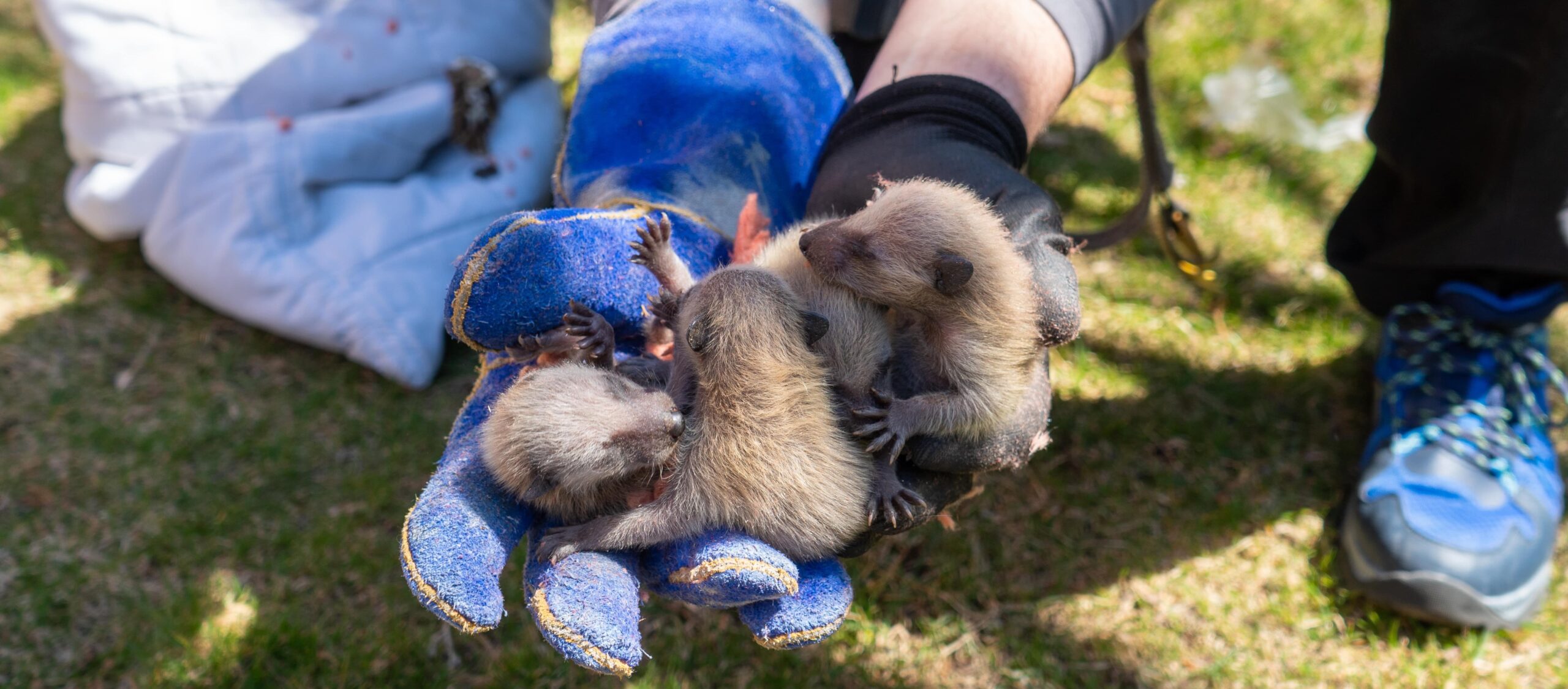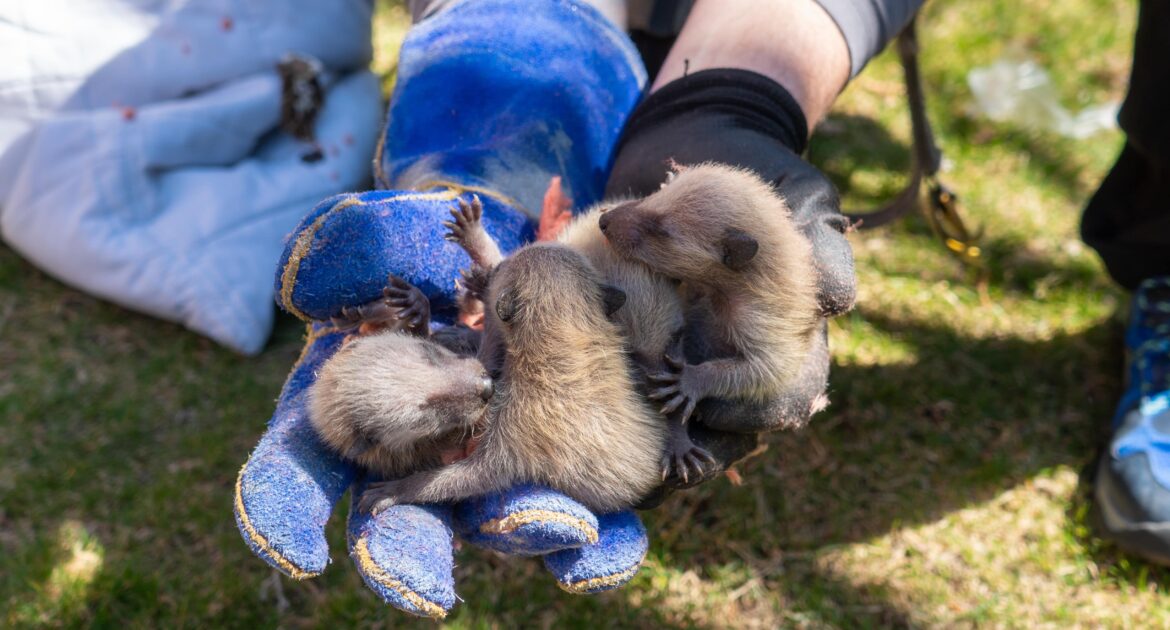Raccoons are remarkable creatures that have bridged the gap between the wilderness and our urban landscapes, establishing a complex social network within the heart of Durham. They are intelligent, adaptable, and sometimes incredibly resourceful. For residents of the city, their presence around homes and businesses can be both a marvel and a potential concern.
Need to know how to deal with raccoons? We got your back. This extensive guide will not only provide insights into the social world of raccoons but also equip you with essential knowledge on how to coexist with these animals in a safe and responsible manner. And we’ll address the scenario where coexistence is no longer an option and professional intervention is necessary in a way that secures both your safety and the welfare of the raccoon.
The Social World We Share with Raccoons
Raccoons, often perceived as elusive creatures of the night, actually thrive in intricate social settings that shed light on their dynamic relationships. Within the world of raccoon society, ‘nursery bands’ emerge as communal units where related females and their young coexist in a group of familial bonds and shared responsibilities.
Contrary to their solitary nature, males transiently integrate into these groups during mating seasons, contributing to the perpetuation of their species before parting ways as swiftly as they arrived. This complex social structure not only underscores the importance of kinship among raccoons but also highlights the dynamics that drive their interactions and reproductive cycles.
As bandits of the night, raccoons spend most of their time during moonlit hours, displaying a mastery of nocturnal life that sets them apart as predators and scavengers. Equipped with keen senses and exceptional night vision, raccoons navigate the darkness with finesse, seizing the cover of night to look for food across a variety of sources.
Their status as highly opportunistic feeders allows them to embrace a varied diet that spans fruits, plants, insects, and small animals, showcasing their adaptability and resourcefulness in the face of changing environments. This culinary flexibility not only ensures their survival but also positions them as resilient inhabitants of urban landscapes, where sustenance is as diverse as the cityscape itself.
In the realm of raccoon territories, boundaries extend across a stretch of land ranging from one to six miles, a testament to their strength in securing resources and asserting dominance within their domain. The size and scope of their territories fluctuate in response to food availability and population density, reflecting their innate ability to adapt to evolving ecological conditions and compete for survival effectively.
Renowned for their prowess as adept climbers and skilled swimmers, raccoons leverage these physical abilities to explore their surroundings, hunt for prey, and evade potential threats with agility and finesse. This blend of instinctual behaviours and adaptive skills amplifies their prowess as versatile predators and survivors in the ever-changing tapestry of the natural world.
What to Do When Raccoons Approach You
Welcoming raccoons as neighbours in the urban landscape can enrich our connection to nature and foster a sense of ecological coexistence. However, to ensure a harmonious living environment for both humans and wildlife, it is essential to establish clear guidelines that promote mutual respect, safety, and sustainability in our interactions with these captivating creatures. Let’s find out what to do when a raccoon approaches you.
Keep Your Distance
While raccoons can captivate with their charm and resourcefulness, it’s vital to maintain a healthy distance and respectful demeanor when encountering these wild creatures. Observing raccoons from a safe vantage point ensures both your safety and theirs, fostering a harmonious cohabitation rooted in mutual respect.
Remember that raccoons are inherently wild animals and should be treated with caution.. Resist the urge to approach, feed, or interact with raccoons, as such actions can disrupt their natural behaviours and potentially lead to conflicts or harm.
Minimizing Attractants
Creating an environment that minimizes attractants and fortifies security measures is key to deterring raccoons from encroaching on your living space. By securing trash cans, sealing food composters or bins, and trimming tree branches that could serve as access routes to your roof, you diminish the allure of your property to curious raccoons seeking sustenance or shelter. These preventive steps not only reduce the likelihood of raccoon visits but also contribute to a cleaner and more tranquil living environment for both humans and wildlife alike.
Home Security
Raccoons, known for their adeptness at seeking refuge in various nooks and crannies, pose a potential threat to the sanctity of your home. Conducting regular inspections to identify and address potential entry points—whether in attics, basements, sheds, or chimneys—is paramount to safeguarding your living space against unwanted intrusions.
Employ heavy-duty materials to secure vulnerable entryways, reinforcing the structural integrity of your home and discouraging raccoons’ attempts to establish unwelcome lodgings within your property. By fortifying your home’s defences and upholding vigilance in maintenance practices, you establish a barrier that upholds the sanctity of your space while respecting the natural habitats and behaviours of raccoons in the vicinity.
The Dangers of DIY Raccoon Removal
Attempting to remove raccoons from your property without the aid of experts can lead to various unforeseen complications, underscoring the value of professional intervention in such situations. The act of displacing these animals without the proper know-how can precipitate not just immediate physical dangers but also long-term legal and health-related repercussions. Here is a closer examination of the risks involved:
- Risk of Injury: These animals can become aggressive when cornered or threatened, leading to serious injuries through bites or scratches.
- Disease Transmission: The risk of zoonotic diseases such as rabies or leptospirosis, which can have severe health implications for humans, is a pressing concern.
- Legal Ramifications: Multiple jurisdictions have specific laws governing the humane treatment and displacement of local fauna. Unknowingly, you might violate these regulations, resulting in fines or legal challenges.
Integrating a hands-off philosophy when it comes to dealing with these creatures emphasizes the importance of seeking experienced professionals who are adept at handling such scenarios crucially and ethically.
Professional Raccoon Removal
When it comes to removing raccoons, it’s not just about taking them away—it’s also about preventing their return and ensuring that they are not harmed in the process. Professional wildlife control technicians have the expertise to approach raccoons safely, remove them humanely, and implement measures to deter future incursions.
The Dangers of Amateur Intervention
Amateur removal attempts can be dangerous for both the homeowner and the raccoon. Inexperienced individuals may not recognize the full extent of the problem, leading to incomplete or inhumane removal methods, and may even come into contact with diseases or experience physical harm.
A professional wildlife technician will first assess the situation and then use humane methods that allow the raccoon to leave without gaining access back inside the property. The raccoon will then be able to move onto a more a suitable environment.
After removal, it’s crucial to address any factors that attracted the raccoon in the first place. A professional will implement preventative measures, such as securing entry points and minimizing attractants, to discourage raccoons or any other wildlife from returning.
Minimize Attractants for Raccoons
In our quest to maintain a peaceful coexistence with the natural world, it’s critical to ensure our homes do not inadvertently become welcoming havens for curious visitors. By minimizing the attractions on our property, we can discourage unplanned guest appearances and foster a healthier, safer environment for everyone. Here are some effective strategies to consider:
- Secure Trash Bins: Ensure trash cans have tight-fitting lids or locks to prevent them from becoming an easy food source.
- Remove Outdoor Food Sources: Keep pet food indoors and clean up any fallen fruits or nuts that might entice an exploratory visit.
- Seal Entry Points: Inspect your home for any cracks, holes, or openings that could serve as gateways and seal them with sturdy, durable materials.
- Maintain a Clean Yard: Regularly dispose of yard waste and trim overgrown vegetation to reduce shelter options.
- Remove Water Sources: Eliminate accessible water sources such as bird baths or p`et water bowls that might attract visitors seeking hydration.
By adopting these preventive measures, we’re not just protecting our homes; we’re also encouraging these visitors to remain in their natural habitat, where they can thrive and contribute positively to the ecosystem. So, let’s work together to create a harmonious coexistence with these fascinating creatures while ensuring the safety and well-being of our families, homes, and neighbourhoods.
Why Seek Professional Assistance?
Hiring a professional wildlife control company like Skedaddle Humane Wildlife Control in Durham ensures a safe and efficient resolution to your raccoon problem. With a focus on both efficient removal and long-term prevention, a certified technician can help you safeguard your property and provide peace of mind.
Our commitment to excellence extends beyond basic removal services, encompassing a holistic and tailored approach designed to address the root cause of your raccoon problem. Through a meticulous inspection process, humane removal techniques, damage repair services, and proactive disease prevention measures, our certified technicians strive to deliver comprehensive solutions that not only resolve existing issues but also fortify your property against future wildlife intrusions.
With a wealth of experience and specialized knowledge in wildlife management, we boast a team of experts equipped to handle raccoon scenarios of any complexity or scale. By staying abreast of the latest removal and exclusion methods, as well as adhering to stringent laws and regulations governing wildlife control in the Durham area, our ensures that each intervention is conducted with precision, efficiency, and utmost respect for the animals and the environment.
At the core of our mission lies a steadfast commitment to safety—for clients, wildlife, and the environment alike. By employing safe and non-toxic solutions, adhering to rigorous safety protocols, and emphasizing ethical practices throughout the removal and prevention processes, we uphold the highest standards of care and responsibility in wildlife management. By prioritizing the well-being of all parties involved and embracing sustainable practices that minimize harm and maximize effectiveness, we set a benchmark for wildlife control companies dedicated to harmony, safety, and ecological stewardship in their operations.
Skedaddle’s Humane Approach
At Skedaddle, we believe in a humane approach to wildlife control. Our mission is to protect not only your home but also the animals we share it with. We understand the complex balance of the ecosystem and recognize every creature’s right to live in a safe and suitable environment.
If you’re facing a raccoon issue that’s too close for comfort, don’t take unnecessary risks. Instead, turn to our team of professionals for a safe and humane solution. Our wildlife control technicians are just a call away, ready to help you reclaim your home while respecting the wildlife around you.
Contact us to request a quote and learn more about how we can assist you with raccoon issues. Trust the experts at Skedaddle for all your wildlife removal needs in Durham.




